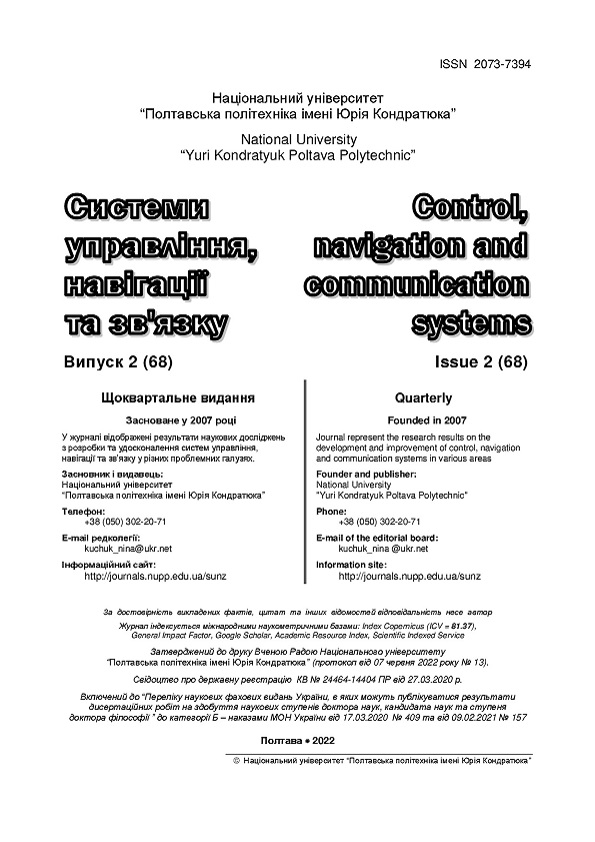ОПТИМАЛЬНИЙ ПАРАМЕТРИЧНИЙ СИНТЕЗ СТОХАСТИЧНИХ СИСТЕМ УПРАВЛІННЯ КІНЦЕВИМ ПОЛОЖЕННЯМ
DOI:
https://doi.org/10.26906/SUNZ.2022.2.019Ключові слова:
чисельний алгоритм, машинне проектування, лінійна стохастична динамічна система, простір параметрів, оптимізаціяАнотація
Предметом досліджень статті є лінійні стохастичні динамічні системи управління кінцевим положенням. Метою роботи є синтез ефективних чисельних алгоритмів машинного проектування лінійних стохастичних динамічних систем управління кінцевим положенням. Завдання дослідження полягають у побудові алгоритмів синтезу, заснованих на застосуванні методу інверсійно-сполучених систем, а також на зниженні розмірності простору параметрів, що оптимізуються. Застосовувані методи: інверсійно-сполучені системи для формування критерію якості, методи зниження розмірності простору параметрів, що оптимізуються на підставі спектрального аналізу матриці кривизни. Отримані результати: пошук оптимальних параметрів у запропонованому підпросторі може здійснюватися всіма методами першого або другого порядку з використанням спроектованих матриць. При досягненні в підпросторі точки мінімуму критерію у ній обчислюються градієнт та кривизна і на підставі спектрального аналізу будується новий підпростір запропонованого типу з наступним повтором процесу оптимізації. Запропонована стратегія пошуку скорочує кількість кроків оптимізації. Практична значущість роботи полягає у тому, що з використанням матриць сполучених змінних отримані ефективні способи обчислення градієнта та кривизни критерію оптимізації. Оскільки час обчислення градієнта за запропонованими залежностями в основному визначається часом інтегрування рівнянь для сполучених матриць, то воно приблизно дорівнює часу інтегрування рівнянь для визначення фундаментальної матриці та дисперсії.Завантаження
Посилання
Dorf R.C. and Bishop R.H. (2011) Modern control system, 12th Edition, Prentice Hall
Denisova L.A. and Meshcheryakov V.A. (2015) “Automatic parametric synthesis of a control system using the genetic algorithm”, Automation and Remote Control, 76(1), pp. 149-156, DOI: https://doi.org/10.1134/S0005117915010142
Denisova L.A. and Meshcheryakov V.A. (2016) “Synthesis of a control system using the genetic algorithms”, IFAC-PapersOnLine, 49(12), pp. 156-161, DOI: https://doi.org/10.1016/j.ifacol.2016.07.567
Макаров И.М., Лохин В.М. (2001) Интеллектуальные системы автоматического управления. Физматлит
Xue D. and Chen Y.Q. (2013) System simulation techniques with MATLAB and Simulink, Chichester: UK, John Wiley & Sons.
Purohit G.N., Sherry A.M. and Saraswat M. (2013) “Optimization of function by using a new MATLAB based genetic algorithm procedure”, International Journal of Computer Applications, 61(15), pp. 1-5.
Deb K. (2001) Multi-objective optimization using evolutionary algorithms, Chichester: UK, John Wiley & Sons.
Goldberg D.E. (1994) Genetic Learning in optimization, search and machine learning. Addisson Wesley.
Deb K., Pratap A., Agarwal S. and Meyarivan T. (2002) “A Fast and Elitist Multi-objective Genetic Algorithm: NSGA-II”, IEEE transactions on Evolutionary Computation, 6(2), pp. 182-197, DOI: https://doi.org/10.1109/4235.996017
Jadaan O., Rao C.R., Rajamani L. (2008) “Non-dominated ranked genetic algorithm for solving multi-objective optimization problem: NRGA”, Journal of Theoretical and Applied Information Technology, pp. 60-67
Van Veldhuizen D.A. & Lamont G.B. (2000). “Multiobjective optimization with messy genetic algorithms”, In Proceedings of the 2000 Symposium on Applied Computing, pp. 470-476, DOI: https://doi.org/10.1145/335603.335914
Sirinaovakul B. & Thajchayapong, P. (1994). “A knowledge base to assist a heuristic search approach to facility layout”, International Journal of Production Research, 32, pp. 141-160, DOI: https://doi.org/10.1080/00207549408956921
Ye M. & Zhou G. (2007). “A local genetic approach to multiobjective, facility layout problems with fixed aisles”. International Journal of Production Research, 45, pp. 5243-5264, DOI: https://doi.org/10.1080/00207540600818179
Scholz D., Jaehn F., & Junker A. (2010). “Extensions to STaTS for practical applications of the facility layout problem”, European Journal of Operational Research, 204, pp. 463-472, DOI: http://doi.org/10.1016%2Fj.ejor.2009.11.012




